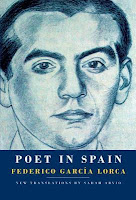A new selection in English of works by one of Spain's greatest poets.
Poetry Review: Poet in Spain is a new translation (by Sarah Arvio) of a variety of works by my favorite poet, Federico Garcia Lorca. She includes a section ("Poems") containing a large, personal selection of poems from various of Lorca's works; a generous selection from Poem of the Deep Song (Poema del cante jondo); all of the Gypsy Ballads (Primero romancero gitano); the Divan of the Tamarit (Divan del Tamarit); the Lament for Ignacio Sanchez Mejias (Llanto por Ignacio Sanchez Mejias); the Sonnets of Dark Love (Sonetos del amor oscuro); and a play, Blood Wedding (Bodas de sangre). This roster includes work from most of Lorca's career (the translator chose not to include poems from his Poet in New York as not being as "Spanish" as the poems she selected, in conformance with the volume's title).
Any collection of Lorca's work is worth reading. What's unique about Poet in Spain is the creative effort taken by the translator, Sarah Arvio, herself a published poet. Arvio has chosen to have Lorca's work conform to her artistic vision. A representative example is a short section (cited by Arvio herself) from the long poem Lament for Igancio Sanchez Mejias. Here Lorca expresses his horror even at the mere time of his friend's death:
Lorca's Original:
A las cinco de la tarde.
Ay que terribles cinco de la tarde!
Eran las cinco en todos los relojes!
Eran las cinco en sombra de la tarde!
Literal translation:
At five in the afternoon.
Ay that terrible five in the afternoon!
It was five on all the clocks!
It was five in the afternoon shade!
Arvio's translation:
At five o'clock
Ay what terrible fives
it was five on all the clocks
In the afternoon shadows
All translators make choices. Even for those who don't read Spanish, it's clear that Arvio has chosen to dispense with Lorca's punctuation. She also removes his variations on the refrain "five in the afternoon" (cinco de la tarde). Arvio's version seems more modern, cleaner perhaps, certainly more concise. But for me there's a loss. First, is simply the accurate representation of Lorca's creation. But second is the rhythm, the drumbeat, the repetition that emphasizes the poet's horror, the music of Lorca's words. Mejias was a matador, which influences both the importance of the time and my translation of sombra as "shade" instead of "shadow" (both are literally correct).
Arvio herself states of her translations: "I've used almost no punctuation; this was my style of composition." (Lorca's punctuation could be quite lively.) "I didn't imitate or replicate Lorca's prosodic strategies directly. I tried to reflect the poems -- to catch their essence."
Readers may appreciate Arvio's interpretations of Lorca's poetry and a more contemporary accessibility. If they buy this book, however, they should do so aware that at times these translations may not closely reflect Lorca's words and so (arguably) may not capture his meaning. This may not be the volume to cite when quoting Lorca in an academic paper. Many translators attempt to remain invisible, to create as little distance as possible between the words of the poet and the reader. Here Sarah Arvio makes herself visible as a poet. As such, some of these poems are more variations or "imitations" (as Robert Lowell called them). Although Arvio's style of translation is not the same as mine, Poet in Spain is clearly a labor of love, taking the time to translate a number of Lorca's poems, in fact complete books, including hard to find works. I'm happy to own it. For those interested in translations closer to Lorca's own creations, large editions of both Lorca's Selected Verse and Collected Poems are available in English from Farrar, Straus and Giroux. Additionally, both Oxford University Press and New Directions have excellent (smaller, cheaper) editions of Lorca's Selected Poems (either fits well in a backpack, purse, rucksack, or book bag). Every translator makes choices and can be second-guessed to death. Poet in Spain is a welcome addition to the debate. [3½★]

No comments:
Post a Comment